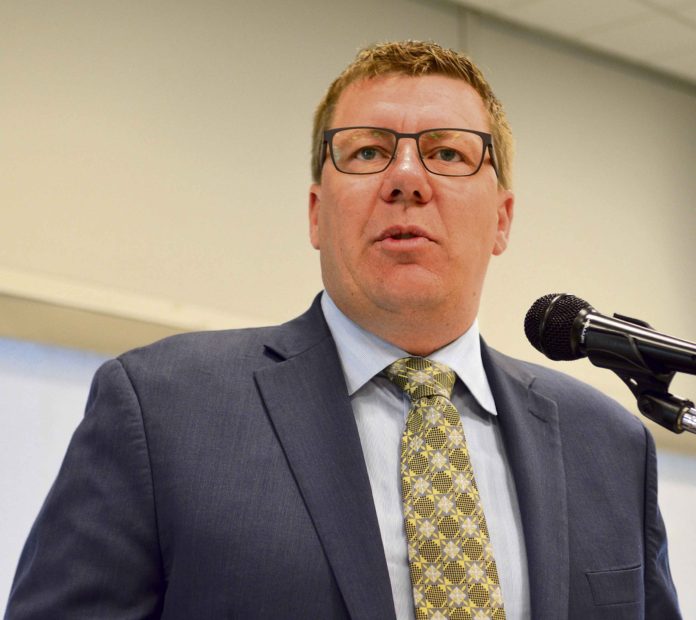
Scott Moe is confidant Saskatchewan will win its impending court case against the federal government questioning the constitutionality of the carbon tax.
The federally-imposed carbon tax was one of the main topics of the premier’s speech at a breakfast event hosted by the Chamber of Commerce Monday morning.
Moe criticized the carbon tax as ineffective, bad policy that would hurt the province’s economy. He also touted the province’s climate change plan, announced late last year, that his government says will reduce emissions and make Saskatchewan more resilient without resorting to carbon pricing.
Moe started off by talking about the province’s export-based economy, which sends potash, agriculture, lumber, steel and energy products to about 150 countries worldwide.
“Each and every day there are container ships crossing our oceans carrying our products,” he said.
“These industries are operating more efficiently and sustainably than their competitors around the world. But these industries also happen to be emitters of greenhouse gases. Each of these sectors, with a federally-imposed carbon tax, overnight would bear a disproportionate burden. They would become less competitive than their competitors around the world.”
Moe described carbon pricing as “seductive” to environmental activists, some economists and some think tanks. But, he said, in Tisdale, Estevan, Shellbrook and Prince Albert, people see it as “nothing more than a government-sponsored shell game … that has real-life consequences for businesses, families and people working in the industries in our province.”
Moe asserted that in no jurisdiction has the carbon tax shown to reduce greenhouse gases.
Even if it did, he said, “not to say we shouldn’t do better” but the impact would be to reduce Canada’s 1.6 per cent of worldwide emissions.
“We’ve said all along that we’re having the wrong conversation and well do everything in our power to ensure the federal government does not impost this flawed policy on our province,” he said.
“Our federal government is attempting to impose this policy on some provinces and not others based on how our province has chosen to exercise its own legislative jurisdiction. Provinces are not, have not and will never be subsidiaries of the federal government. That is not how our Canadian constitution operates. (The federal government) does not have the right to impose or not impose a tax based on their assessment of some provinces’ policies.”
That’s why Moe said he believes Saskatchewan will win its legal battle. Responding to media questions after his speech, Moe denied that the move is purely delay tactics in the hope the Conservatives come to power in the next federal election.
“We like our chances,” the premier said. ‘The case that we have put forward is a strong case, even the recommendation that came from the Province of Manitoba supports the question that we put forward at the Court of Appeal.”
Moe said it’s possible Ontario could also support Saskatchewan, as newly-elected Premier Doug Ford has indicated he will end that province’s cap and trade program and fight the federal government in court. Moe said he has spoken to many of his fellow premiers over the past few weeks, and will continue to do so. When asked what would happen if the court were to rule in the federal government’s favour, Moe simply said he’s “looking for a favourable outcome.”
The NDP has criticized the Saskatchewan Party’s approach, arguing that if the Sask. Party is unsuccessful, Saskatchewan will have a carbon tax designed by the feds, instead of one designed at home that could have mitigated the response.
As for experts in constitutional law, according to two interviewed by Arthur White-Crummey of the Leader-Post, the case is either “an unlikely crusade with political overtones or a real legal conundrum that could go either way.”
White-Crummey spoke to a pair of constitutional scholars. John Whyte, a former NDP deputy minister, portrayed it as the province having both an unintelligible and a plausible argument, but the federal government having one that’s stronger. Former Sask. Party candidate Bob Hawkins, said it’s impossible to predict which way it will go, but that both sides have a leg to stand on. He said the court would likely want to find a solution that avoids giving either side “too big of a win.”
Meanwhile, the province is continuing to develop its climate change plan, called Prairie Resilience. When the plan was released, it was critiqued as being light on details. It referenced specific emissions targets for specific industries, but did not outline what those targets will be.
Moe said that information is coming sooner rather than later.
“We’ll see targets start to come out on an industry-specific basis over the course of the next number of months, over the course of the summer,” he said.
“We continue to work with industries to ensure that we are realizing what is possible and how we can stretch what is possible here in the Province of Saskatchewan, but ensure that we have actual emissions reductions in our industries (and) continue to have our industries operating here.”
Moe also touted Saskatchewan’s use of carbon capture coal generation as well as low-emissions farming techniques as “opportunities” the province can sell to producers elsewhere in the world to help them reduce emissions.
He was made sure to point out the carbon sequestration that occurs in the province’s grasslands, farmlands and forests.

